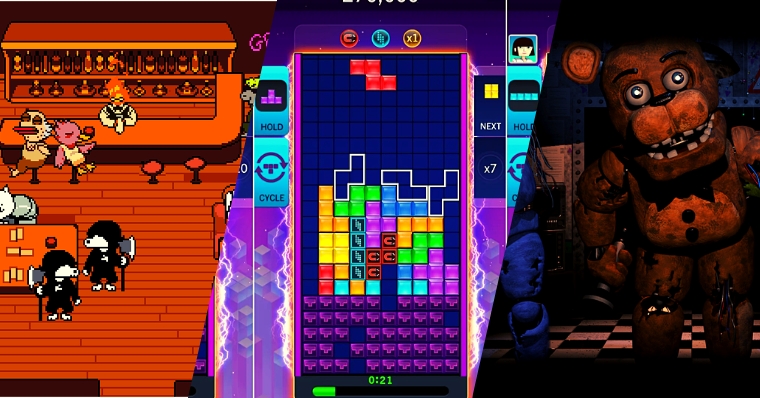Diving Deep into Games that Captured Hearts with Minimalism. In the vast gaming galaxy, the luminous stars are often created by gaming giants like Ubisoft and Square Enix. Their productions gleam with breathtaking graphics, intricate narratives, and countless hours of gameplay intricacies that gamers dive into. But here's the twist in the tale: amidst this cosmos of epic productions, some indie games - modest and uncomplicated - have managed to shine just as brightly. It's like stumbling upon a hidden gem when you least expect it. Despite their simplicity, these games have a knack for presenting fresh, out-of-the-box ideas. Below, dive into a curated selection of 10 simple games that unexpectedly stole the show!
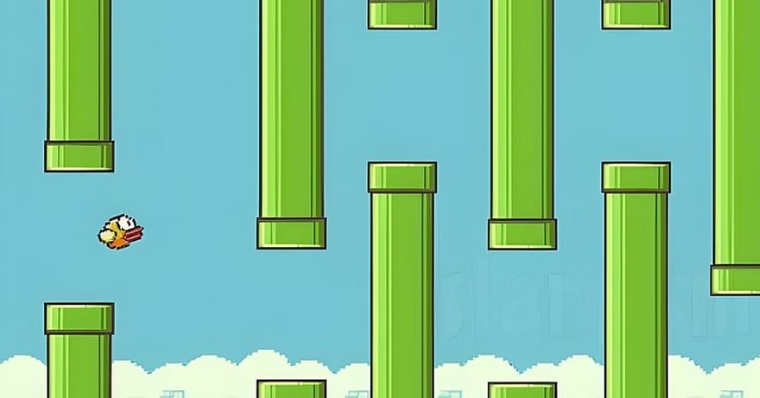
Flappy Bird
Let's take a journey back to 2013. Remember a time when our mobile screens were dominated by a seemingly innocent yet maddeningly challenging game? Enter "Flappy Bird". Its premise was delightfully uncomplicated. Tap the screen, and the tiny bird takes a short lift, attempting to navigate between an array of treacherous pipes. Sounds easy, right? Well, here's where things got tricky. The sheer precision required to keep that bird airborne and pipe-collision-free was, frankly, brutal. One misstep and our feathered friend would find himself on a quick trip to the ground. In no time at all, this game skyrocketed in popularity. Suddenly, everyone, from your next-door neighbor to your co-worker, seemed to be engrossed in this whimsical world of flight and pipes. It was as if a simple touch-based game had cast a spell on mobile users, making them insatiably hungry for one more go, one more attempt to set a new personal best. And in an era where lavish game productions were starting to rule the roost, "Flappy Bird" stood out as a testament to the allure of simplicity.
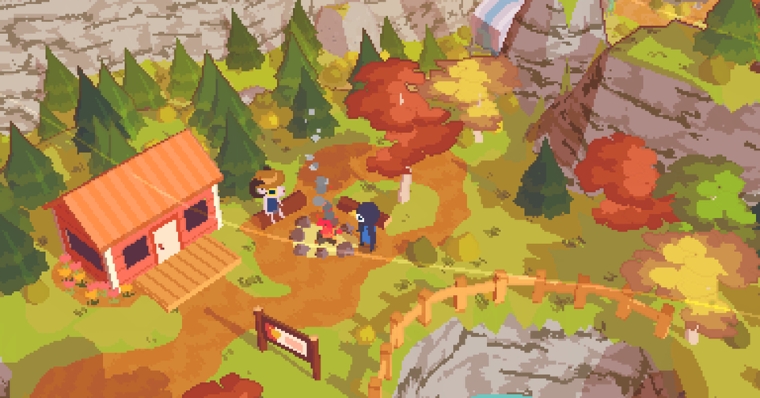
A Short Hike
Take a step back to 2019, and let's chat about "A Short Hike". In this uniquely crafted gem, you step into the feathers of a small bird, embarking on an adventure across the scenic Hawk Peak Provincial Pike. What's the mission? To reach the summit, all to catch that elusive cell signal. In our hyper-connected world, the quest feels both nostalgic and strikingly relevant. Its visual style is a nostalgic nod to PlayStation 1-era graphics. While this choice might have deterred a few modern graphic enthusiasts, it bestowed upon the game an unparalleled charm, reminding many of simpler gaming days. As you tread and flutter your way up, you don't just traverse the landscape—you engage with it. Interactions with both the environment and its inhabitants paint a vivid tapestry of life in that region. From casual banter to deeper insights, you're offered a glimpse into the lives and tales of Hawk Peak's denizens. Despite its succinct nature, "A Short Hike" left an indelible mark on its players. It wasn't about epic battles or intricate puzzles; it was about the journey and the gentle waves of emotions it stirred. It was about embracing the simple joys and leaving players with a warm, comforting glow long after the hike was over.

Unpacking
"Unpacking", launched in 2021 makes its way across Consoles, PC, and mobile devices. At first glance, the game's premise might seem like an exercise in simplicity. As the title suggests, you're, well, unpacking. Unfurling belongings from boxes and setting up a new space might sound pretty straightforward. But here's the kicker: there's no guidebook, no strict rules to abide by. It's just you, your instincts, and the canvas of an empty home. Yet, as you delve deeper, sifting through every item and placing it just so, a richer narrative unfolds—one that's crafted without a single line of spoken dialogue. It's a tapestry woven from the minutiae of everyday life. A dog's chew toy might hint at a cherished pet, while a collection of postcards might whisper tales of far-off adventures. These items, mundane as they might appear, come together to sketch out the life of our protagonist, revealing poignant milestones, the people she's shared her life with, and the myriad stories etched into every corner of her life. So while on the surface, "Unpacking" feels like a soothing puzzle of organizing and settling in, it's also a masterclass in storytelling. A gentle reminder that sometimes, the most compelling tales are hidden in plain sight, waiting to be unearthed from the ordinary.

Tetris
Dive deep into the annals of gaming lore, and you'll stumble upon "Tetris." Among the pantheon of legendary games, 'Tetris' holds its own with an understated elegance and simplicity. Its magic? Getting those quirky-shaped blocks to fit perfectly together, forming satisfyingly complete horizontal lines. Every completed line brings that sweet jingle of accomplishment and, of course, those much-coveted points. But here's a bit of trivia for the uninitiated: "Tetris" has its roots in the cold stretches of Russia. Dreamt up by Alexey Pajitnov, an IT engineer ensconced in the Russian Academy of Sciences' Computer Center, this game was the breakout star nobody saw coming. It's like Pajitnov had this secret recipe, a blend of abstract thinking and arcade fun, that took the world by storm. Now, fast forward to our current day, and "Tetris" is everywhere. From classic renditions that mirror its original charm to innovative takes that add a twist here and a tweak there, the game has evolved while remaining true to its core. It's that game you find yourself returning to, whether you're a newbie looking for casual fun or a seasoned gamer craving nostalgia. It's an ode to the beauty of simplicity and a testament to the idea that sometimes the most straightforward concepts leave the most profound impact.
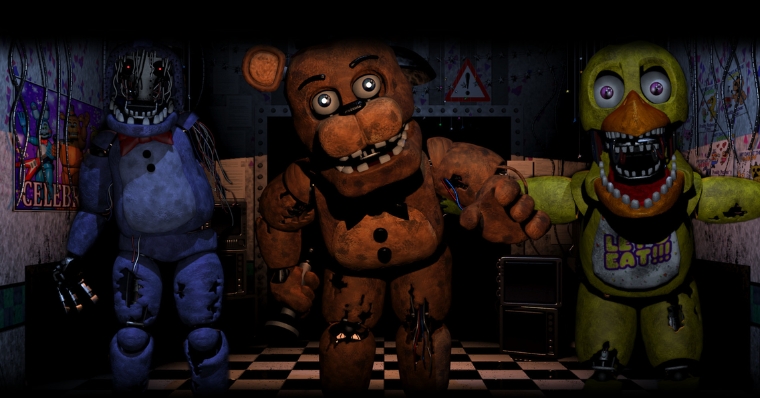
Five Nights at Freddy's
Let's take a winding trip down memory lane, back to 2014. The year gave us some incredible moments, but in the gaming community, one name started to echo in hushed whispers - "Five Nights at Freddy's." Crafted by the innovative Scott Cawthon, this game blended horror elements with a straightforward task – you're a night security guard, and your job is to make it through the night. Sounds easy? Think again. You're stationed at Freddy Fazbear's Pizza, a joint that could've been any regular pizza place if not for its eerie robotic residents. These animatronic creatures, probably intended to entertain during the day, take on a much more sinister role when the sun goes down. Now, here's where the fun (or, should we say, the fright?) begins. You've got a bunch of surveillance cameras to monitor these unpredictable bots and limited power to work with. Every action, from flicking through the cameras to slamming the security doors shut, drains the precious energy you need to survive until dawn. It's a meticulous balancing act between conserving energy and ensuring these mechanical nightmares don't get too close. With such a spine-chilling yet deceptively simple premise, it's no wonder "Five Nights at Freddy's "skyrocketed in popularity. It became more than just a game; it's a phenomenon, proof that sometimes, the things that terrify us the most are the things we can't reasonably predict. And while there have been countless horror games since, something uniquely unsettling about those long shifts at Freddy's keep players returning for more.

Papers, Please
Step into 2013. Among a sea of flashy, action-packed games, one title that was anything but ordinary emerged - "Papers, Please." Dreamed up and brought to life by the talented Lucas Pope, this game's brilliance lies not in its complexity but in its stark simplicity. It explores morality, judgment, and the shades of gray that come with wielding a touch of power. So, what's your role in this narrative? You're an immigration inspector stationed at the border of Arstotzka. Your task? To determine who gets to set foot in the nation. Sounds uncomplicated? All you need to do is review some documents, right? Well, that's where things get intriguing. It's more than just verifying names and checking dates. As days unfold, the nuances of each person's story seep through. The weight of your decisions grows heavier. Sure, you could just follow the rulebook, but as you'll discover, it's not always black and white. Families long for reunification, refugees escaping persecution, and spies with concealed intentions. While swiping through those papers, you'll be pulled into the geopolitical tensions between Arstotzka and its neighboring country, Kolechia. But it's not just about international relations. The game delves deep, raising questions about our own world and touching upon issues like discrimination, corruption, and the lengths people will go to for a better life. In "Papers, Please," every stamp echoes with a story. Every choice matters. And sometimes, in the quiet moments between the buzz of the borderline, you'll find yourself reflecting, not just on Arstotzka's dilemmas, but perhaps your own as well.
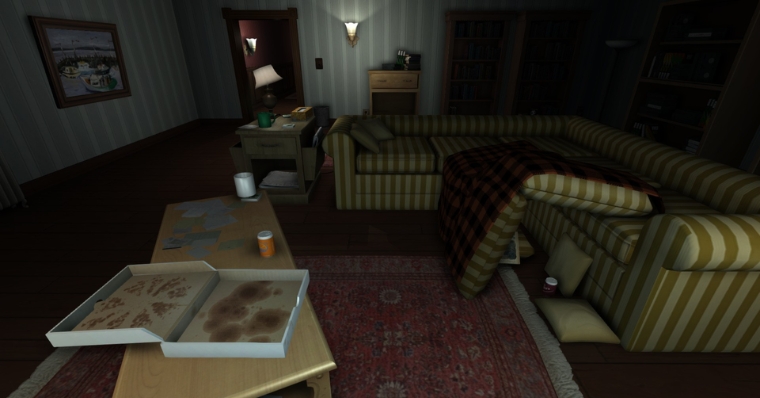
Gone Home
2013 was quite a year for the gaming community. Among the many releases, there was one game, "Gone Home," which danced to its own tune, and let me tell you, it did so beautifully. Available on PC, the initial moments of this game might have you scratching your head. You find yourself in a dimly lit house, meandering around, picking up odds and ends. And given the moody setting and the distant echo of sounds, you'd be forgiven for thinking, "Oh, I've walked straight into a horror show." But this isn't your usual jump-scare fest. It's not about things that go bump in the night. Instead, it's a deeply emotional journey. As you discover scattered letters around the house, a rich tapestry of a story unfolds, piecing together events and relationships that once filled the very rooms you're wandering through. What really made "Gone Home" a game-changer (pun intended) was how it pioneered and championed the Walking Simulator genre. And no, it's not about mimicking your morning stroll to grab coffee. This genre invites players to take their time, soak in every detail of the environment, and fully immerse themselves in the surrounding narrative. There's no rush, no ticking clock. Just a world ready to reveal its secrets, one step at a time. In an industry packed with high-octane action, "Gone Home" is a breath of fresh air, reminding us that sometimes, the most profound stories can be found in the quietest moments. So you know where to turn the next time you're in the mood for a serene, reflective gaming experience.
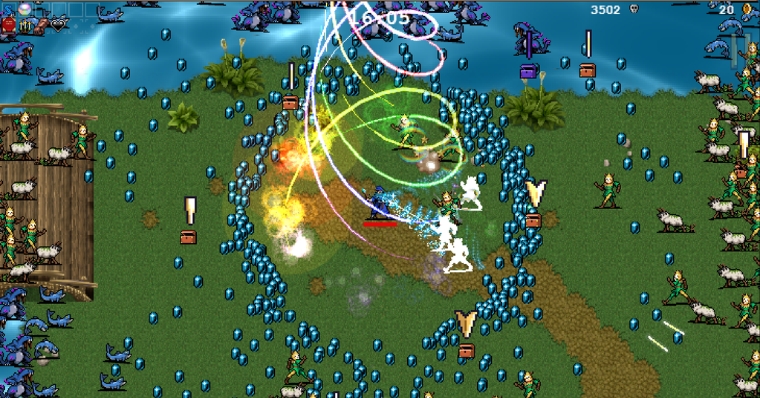
Vampire Survivors
So, 2021 had its fair share of surprises, but in the gaming world, "Vampire Survivors" was, without a doubt, a standout. Popping up on Steam towards the end of the year with a super-affordable price tag, equivalent to 3 reais, this gem flew under the radar initially. It had characters reminiscent of the ones in Castlevania and was built around a straightforward mechanic. No fancy button smashing here – your character attacked on its own. The player's job? Just move around, dodge menacing creatures, and scoop up items to level up. The elegance of "Vampire Survivors" lies in its simplicity. While players only need to focus on movement, the automatic rhythm of the attacks varies based on the weapon at hand. In a world where intricate graphics and complex gameplay are often the gold standard, the stripped-back visuals and ultra-intuitive play of "Vampire Survivors" seemed like an underdog. Little did we know, it was poised to take the internet by storm in just a few months. Enter Luca Galante, the mastermind behind the game. Observing the unexpected surge in its popularity, he didn't just rest on his laurels. Instead, he fueled the fire with a series of updates: new weapons, refreshed scenarios, an expanded roster of characters, and some visual sprucing up. And just like that, 'Vampire Survivors' wasn't just a game anymore – it became a trendsetter. The game's unique auto-combat mechanism lit a spark, inspiring a flurry of other titles to incorporate this hands-off combat approach—a testament, truly, to how innovation can come from the most unexpected quarters.
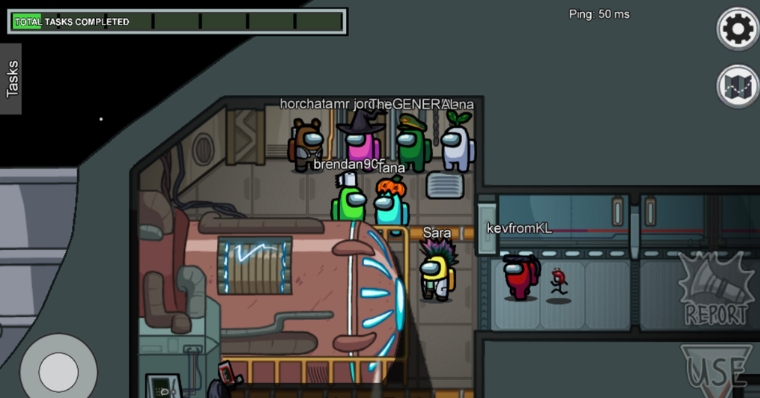
Among Us
The year is 2018, and a seemingly straightforward game named "Among Us" makes its quiet entry into the gaming scene. Fast forward to the pandemic era and boom! It's everywhere – from casual players to streamers and even those who haven't touched a game in years. Quite the sleeper hit, wouldn't you say? The premise is deceptively simple. Toss in 4 to 15 players into a closed environment, and there's a catch: among them lurk one or more impostors. These sneaky characters have a dark agenda – to pick off their fellow players one by one without blowing their cover. Meanwhile, the innocent crewmates are racing against the clock. They've got two choices: pinpoint the cunning impostor in their midst or hustle to finish tasks and make a break for it. What really cranks up the tension in 'Among Us' isn't just the thrill of chasing or evading an impostor. No, it's the spine-chilling meetings when players hash it out, hurling accusations, stitching together alibis, and second-guessing each other's every move. The core allure? That delicious, unpredictable human element. You might be playing with friends you've known for ages, but suddenly, you're eyeing them with suspicion, questioning every "I was in Electrical" or "Saw Green in MedBay." It's all about the art of deception, intuition, and, let's face it, some top-tier bluffing skills. And while players can zip around rooms, tinkering with tasks here and there, the impostor has that deadly 'kill' button at their disposal. But that's the easy part. The real challenge? Dodging suspicion, especially when everyone's debating who's telling the truth and who's spinning a web of lies. So, in an era where most of us were physically isolated, "Among Us" turned out to be a quirky paradox - bringing people together while simultaneously teaching them not to trust anyone. The magic of gaming, eh?
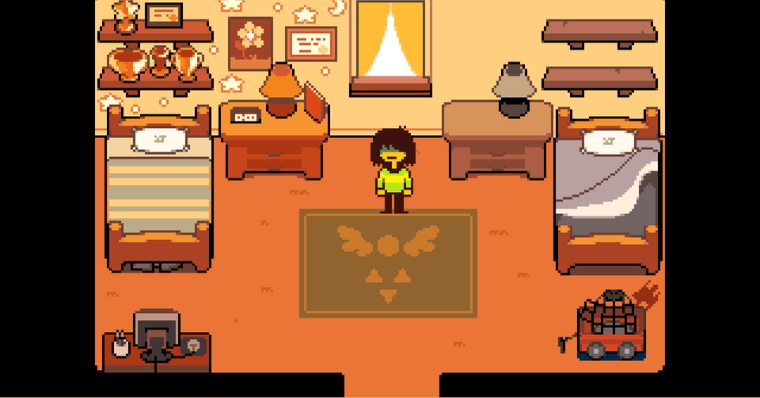
Undertale
Cast your mind back to 2015, when the indie game scene was sprinkled with some gold. Among those treasures, Toby Fox unveiled "Undertale," a game he single-handedly crafted, and it was nothing short of spellbinding. Taking cues from the legendary Nintendo RPG "Earthbound," the narrative dives into the life of a child who stumbles into an enigmatic cave. But instead of the usual dark, dreary cave trope, this one spirals down into a vibrant, sometimes whimsical, and often dangerous magical realm. And here's the kicker – the game is a masterclass in moral choices. Rather than the standard hack, slash, and pummel approach, "Undertale" teases out the human in us. How, you ask? By giving players the golden option of a no-kill playthrough. Every enemy encounter is a puzzle wrapped in a dance. You could get all chatty with them, maybe throw in some humor, or even shower them with affection. The turn-based mechanics, reminiscent of iconic titles like "Final Fantasy," challenges players to think and react. But let's touch on the visuals for a second. The game rocks the pixel art aesthetic. Now, while some might brush it off as "retro" or "not their cup of tea," there's an undeniable charm to it, a warmth that captures the essence of classic gaming. But beyond its clever mechanics and artsy design, "Undertale" is an emotion-packed roller coaster. It juggles humor with heart, serves lessons on friendship and choices, and reminds players about the power of compassion. So, if you're up for a game that's as much a feel-trip as a fun ride, give 'Undertale' a spin. And trust me, it's a journey worth taking.











